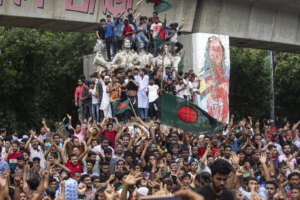Dhaka Erupts in Chaos: Hasina Resigns, Flees, &Interim Govt Formed
Shazia Mehboob/AFP
Islamabad: Thousands of people have taken to the streets of Dhaka, Bangladesh, following the resignation of Prime Minister Sheikh Hasina amid weeks of deadly protests against her government.
In a national address, Army Chief General Waker-Uz-Zaman announced the formation of an interim government after talks with political parties.
The move came as large crowds stormed the Prime Minister’s official residence, causing significant damage. Images from local media showed protestors overturning furniture, smashing glass door panels, and taking away books and other items from the palace.
Hasina, who had ruled Bangladesh since 2009, fled the country amid severe unrest that resulted in nearly 100 deaths on Sunday.
Bangladesh PM Flees Country
Facing mounting pressure to step down, Sheikh Hasina was evacuated by helicopter after protesters stormed her palace in Dhaka. Initially, she left by motorcade but was later airlifted. According to reports, she arrived at Hindon Air Base near New Delhi on a Bangladesh Air Force aircraft.
Her departure follows a day of intense violence, with at least 300 people reported dead in the protests. The situation deteriorated further on Sunday night, leading to a curfew and additional casualties.
Dhaka Celebrates Chaos
Despite the ongoing violence, the mood in the streets of Dhaka shifted to one of celebration after news of Hasina’s departure spread.Jubilant crowds waved flags, danced on tanks, and breached the gates of the Prime Minister’s residence, celebrating and looting as they went.
Channel 24 captured footage of people running through the compound, celebrating, and making off with furniture and books while others relaxed on beds.
Jubilant crowds had waved flags, some dancing on top of a tank in the streets on Monday morning before hundreds broke through the gates of Hasina’s official residence. Bangladesh’s Channel 24 broadcast images of crowds running into the compound, waving to the camera as they celebrated. Others smashed statues of Hasina’s father, Sheikh Mujibur Rahman, the country’s independence hero.
Nation Awaits Address
Bangladesh’s army chief, Waker-Uz-Zaman, would address the nation on Monday afternoon, a military spokesman told AFP without providing further details.
Before the protesters stormed the compound, Hasina’s son urged the country’s security forces to block any takeover from her 15-year rule.
“Your duty is to keep our people safe and our country safe and to uphold the constitution,” her son, US-based Sajeeb Wazed Joy, said in a Facebook post. “It means don’t allow any unelected government to come in power for one minute; it is your duty.”
Security forces had supported Hasina’s government throughout the unrest, which began last month against civil service job quotas and escalated into wider calls for her to stand down. But the protesters defied curfews and deadly force.
Deadliest Day Recorded
At least 94 people were killed on Sunday, including 14 police officers, in the deadliest day of the unrest. Protesters and government supporters countrywide battled each other with sticks and knives, and security forces opened fire.
The day’s violence took the total number of people killed since protests began in early July to at least 300, according to an AFP tally based on police, government officials, and doctors at hospitals.
Waker told officers on Saturday that the military “always stood by the people,” according to an official statement.
The military declared an emergency in January 2007 after widespread political unrest and installed a military-backed caretaker government for two years.
Hasina has ruled Bangladesh since 2009 and won her fourth consecutive election in January after a vote without genuine opposition. Her government is accused by rights groups of misusing state institutions to entrench its hold on power and stamp out dissent, including through the extrajudicial killing of opposition activists.

Demonstrations began over the reintroduction of a quota scheme that reserved more than half of all government jobs for certain groups. The protests escalated despite the scheme having been scaled back by Bangladesh’s top court.
Soldiers and police with armored vehicles in Dhaka had barricaded routes to Hasina’s office with barbed wire on Monday morning, but vast crowds flooded the streets, tearing down barriers. The Business Standard newspaper estimated as many as 400,000 protesters were on the streets, but it was impossible to verify the figure.
“The time has come for the final protest,” said Asif Mahmud, one of the key leaders in the nationwide civil disobedience campaign. In several cases, soldiers and police did not intervene to stem Sunday’s protests, unlike during the past month of rallies that repeatedly ended in deadly crackdowns.
‘Let’s be clear’
“Let’s be clear: The walls are closing in on Hasina. She’s rapidly losing support and legitimacy,” Michael Kugelman, director of the South Asia Institute at the Washington-based Wilson Center, told AFP. “The protests have taken on immense momentum, fueled by raw anger but also by the confidence that comes with knowing that so much of the nation is behind them,” he said.
In a hugely symbolic rebuke of Hasina, a respected former army chief demanded the government “immediately” withdraw troops and allow protests. “Those who are responsible for pushing people of this country to a state of such extreme misery will have to be brought to justice,” ex-army chief General Ikbal Karim Bhuiyan told reporters on Sunday.
The anti-government movement had attracted people from across society in the South Asian nation of about 170 million people, including film stars, musicians, and singers.

Comments are closed.